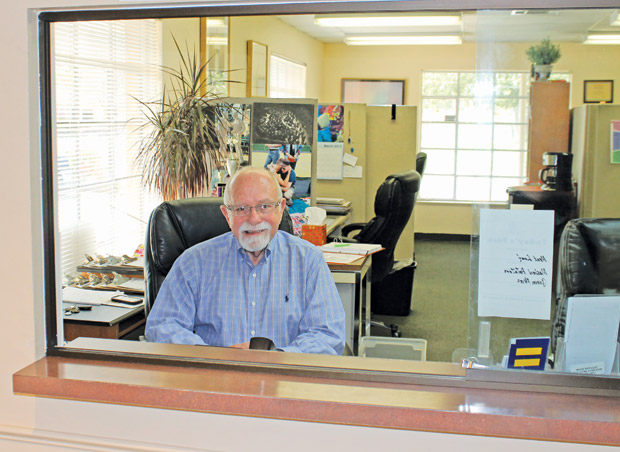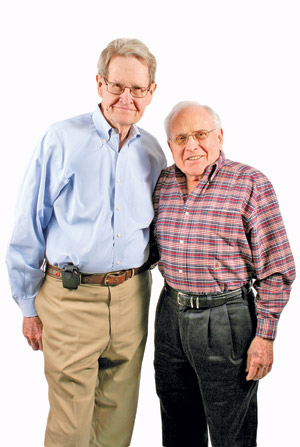Resource Center Dallas launches program to address needs of LGBT seniors as community reaches ‘precipice of a pandemic of aging’

NEW AGE OF LGBT SERVICES | Jim LeCroy, 72, stays active by volunteering at the front desk of Resource Center Dallas two days a week. However, he says many other LGBT seniors are isolated, one of the reasons why the center’s Gray Pride program is needed. (Anna Waugh/Dallas Voice)
Jim LeCroy has a partner and stays active by volunteering at Resource Center Dallas twice a week.
For the last four years, LeCroy has participated in the center’s volunteer-run program for seniors, the GLBT Aging Interest Network, or GAIN.
“I’m out and about,” said LeCroy, 72. “But many [LGBT seniors] don’t have resources and find themselves alone.”
LeCroy said GAIN helps people get out. He’d like to see more social and educational programs but doesn’t want to limit those to the elderly. He wants to help younger people plan ahead for their golden years.
“Some day there will be a cure for HIV,” he said. “Will there ever be a cure for old age?”
To address a range of issues from isolation to housing, the center recently hired a part-time employee, Shelley Hamilton, to oversee the senior program, which has been renamed Gray Pride.
“We’re at the precipice of a pandemic of aging,” Hamilton said.
An ordained Metropolitan Community Church pastor for almost 40 years, Hamilton came to Dallas in the ’90s as Cathedral of Hope’s AIDS chaplain, moved to Wichita, Kan., for 10 years and returned to Dallas seven years ago as COH’s congregational care chaplain.
For the next few months, Hamilton plans to gather data while beginning to offer monthly programming. And she wants to start a dialogue with other agencies rather than reinventing what others in the community already do well.

RETIREMENT COMMUNITY | Although housing is often cited as the biggest problem for LGBT seniors, everyone’s needs are different. Gay Dallas couple Jack Evans, 83, and George Harris, 79, would like to remain in their home but seek access to services and ways to remain engaged.
Last fall, RCD assessed GAIN and received survey answers from 700 respondents. Added to information gathered from executive directors of LGBT community centers across the country, senior programs became part of the center’s new strategic plan.
CEO Cece Cox said the next step in developing Gray Pride was hiring its first staff member to work specifically on senior issues.
She put isolation at the top of the list.
“Care tends to come from our circle of friends rather than from a bio family,” Cox said of LGBT seniors.
She cited a number of reasons. Gays and lesbians are less likely to have children to care for them. Some are estranged from their biological families. With fewer ties, many have moved away.
“We want to provide more frequent opportunities to get together,” Cox said.
That would deal with isolation and help older people build their support networks.
Counseling would be another component including group peer support.
“Grief is an issue,” she said.
After living through the worst of the AIDS crisis, those approaching old age and already there should have quite a bit of experience with loss. But Cox wonders how many actually learned to grieve and how many simply learned to cope. Many people went from one funeral to another and then returned home to care for someone else living with AIDS.
But that developed a generation of good caregivers. Gray Pride hopes to tap into that experience and connect people.
“Nutrition is an issue in the U.S., but for seniors it gets more complicated,” Cox said.
She said mobility is a problem, both in getting out to buy food and in getting around the house to prepare it.
“Housing is a gigantic issue that comes up,” she said.
But that’s on the long-range to-do list. Cox said the Los Angeles Gay and Lesbian Community Center is about to do some senior housing and the Chicago center has created some partnerships.
Serena Worthington, director of community advocacy and capacity building for the national LGBT seniors group SAGE, said every city is different and has different needs. But each city must make a specific commitment to its LGBT elders, she added, praising RCD’s effort.
The SAGE Center in New York City offers meditation, dinner, a support group for men living with HIV, films, an acting class, a creative writing workshop, a drawing class and telephone support for homebound elders. And that’s just on Mondays.
“I urge folks to do modest programming but make it sustainable and regular,” Worthington said. “Coffee and conversation.
Pairing a monthly meal with a program.”
Worthington cited housing as a huge problem. With as many as 3 million LGBT seniors around the country, five cities are building properties specifically for this group. The largest are in Philadelphia and Chicago, with just 90 units. Los Angeles is adding 40 units to its existing property.
“We could build now and never keep up,” she said.
But she said the days of gays and lesbians going back into the closet when they enter nursing homes are numbered.
“This generation is less tolerant of being discriminated against,” she said.
The government is paying attention and giving guidance to nursing facilities. And the Human Rights Campaign is working on a nursing home index similar to its Corporate Equality Index.
Worthington thinks nursing homes will improve acceptance and quality of care for LGBT residents fearing a bad rating could scare away business.
Hamilton wants to come up with creative solutions for LGBT elderly housing. She doesn’t believe there’s one solution.
Building an LGBT senior facility from the ground up, she said, would take millions of dollars at a time when RCD is already in the middle of capital campaign for its new home.
Besides, not all seniors have the same housing needs.
For example, Jack Evans, 83, and George Harris, 79, said most of their friends are 20 years younger and Evans continues to work. The couple sold real estate for decades but lost most of their listings when the market began to crash in 2005. They’ve also participated in GAIN programs.
Evans and Harris want to remain in their home as long as possible with access to services and ways to remain engaged.
Hamilton likes the approach used by AIDS Services of Dallas, which has bought existing apartment buildings and renovated them for assisted living.
On her wish list is someone donating a large home for a group of seniors to live communally. And for nursing care, the best fix for the short term is finding an existing facility with staff sensitive to the needs to LGBT elders.
The additional specialties of caring for people living long-term with HIV and medical and social needs of elderly transgenders make that a challenging goal.
Hamilton called establishment of the Gray Pride program an example of visionary thinking.
“I think it’s a courageous step on the part of our executive director,” she said.
For more information call Resource Center Dallas at 214-528-0144 and ask for Shelley Hamilton.
This article appeared in the Dallas Voice print edition March 29, 2013,















